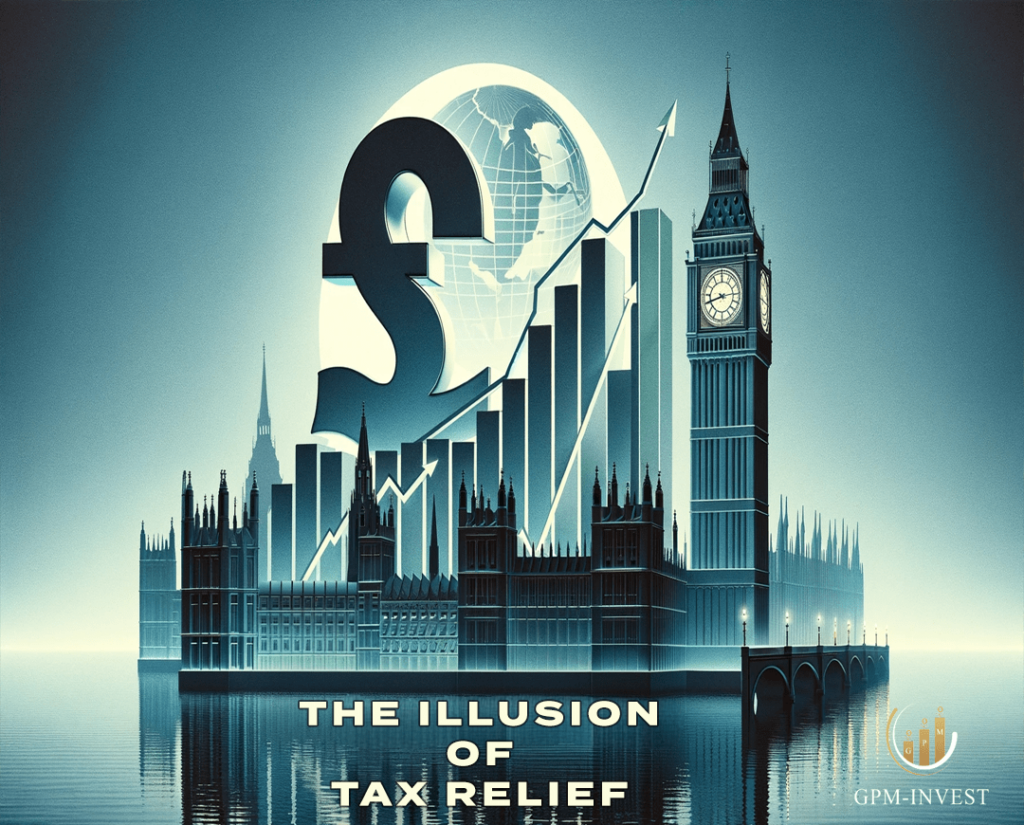The Illusion of Tax Relief: Unveiling the UK’s Fiscal Façade
By the Digital Zeitgeist, Geopolitical and Financial Analyst based in the UK
The Promise Versus the Reality
In a bold assertion that rattled the pillars of the UK’s financial discourse, Chancellor Jeremy Hunt proclaimed his tax cuts as “the biggest in history”. This claim, however, quickly unfurled into controversy, scrutinised by economic experts and the public alike. Despite the announced 2% cut in national insurance and business tax reduction, the overall tax burden is on an upward trajectory, poised to hit a post-war peak.
Dissecting the Chancellor’s Claims
The veracity of Mr Hunt’s statements came under heavy fire when the Conservative Party’s advert was juxtaposed with a sobering “community note” on social media, highlighting the impending tax burden. Compounding this, the Office for Budget Responsibility (OBR) corroborated the gloomy forecast, indicating a fiscal climate with the highest taxes since World War II, despite the Chancellor’s concessions.
A Clash on the Airwaves
The BBC’s Nick Robinson did not mince words when he confronted Mr Hunt on Radio 4’s Today programme, branding the tax cut claims as “fundamentally dishonest” and “downright misleading”. Mr Hunt’s defence was firm, acknowledging the tax increase as a necessary evil to mitigate Covid-incurred debts but underscoring his intent to reduce the tax load progressively.
Tax Cuts: A Step Forward or Back?
As the Chancellor admitted, the recent tax cuts are merely an initial stride towards easing the fiscal pressures on families. However, Labour’s shadow chancellor, Rachel Reeves, critiqued the measures for not adequately compensating for the “fiscal drag” that has ensnared more taxpayers. The Institute for Fiscal Studies (IFS) delivered a poignant critique, calculating that for every pound extracted from taxpayers, a mere quarter is returned in tax cuts.
A Parliament of Taxation
The IFS did not shy away from branding the current parliament as potentially the “biggest tax-raising” in modern history. Carl Emmerson, an IFS economist, highlighted the unprecedented rise in GDP proportionate taxes, setting a new high-water mark for fiscal extraction.
The Socio-Economic Divide:
In the UK’s current fiscal landscape, a stark socio-economic divide is emerging, where tax policies disproportionately favour the affluent. The Resolution Foundation and the Institute for Fiscal Studies (IFS) have pointed out that the richest fifth of the population stand to gain the most from recent tax cuts and benefit changes, while the concept of ‘fiscal drag’ continues to silently escalate the tax burden on middle and lower-income families. This has prompted criticism from economic analysts, who argue that the slight national insurance reduction does little to offset the stealthy erosion of real incomes due to tax bracket creep and inflation.
Moreover, the Chancellor’s touted ‘expensing’ tax break for big businesses—projected to cost the Treasury a modest £3bn yearly in the long run—reveals a fiscal policy that seems to lean towards corporate interests rather than delivering significant relief to the broader populace. This approach has led to characterisations of the current economic strategy as a disaster for average households, with real incomes expected to fall, widening the economic gap and potentially setting the stage for more pronounced socio-economic disparities in the future.
A Closer Look at Pre-Election Giveaways:
Pre-election periods are frequently characterised by governmental giveaways, aiming to sway public opinion and secure electoral advantage; however, such short-term fiscal generosity often comes under fire for its long-term economic prudence. In the UK, Chancellor Jeremy Hunt’s recent tax cuts, juxtaposed against a backdrop of mounting public debt and an expanding tax burden, have sparked speculation of their timing as precursors to an early general election. This strategy, while potentially bolstering immediate public support, risks future economic stability by promising upfront relief that may necessitate stringent fiscal rectifications post-election. As strategists like Isaac Levido gear up for potential election campaigns, the interplay between immediate political gains and sustainable economic policy becomes a central concern, with the outcome likely to leave an indelible mark on the nation’s fiscal health.
The Long-term Outlook
The long-term fiscal outlook for the UK is precarious, as current policies point towards a high-tax economy with socio-economic disparities on the rise. The Chancellor’s tax cuts favour the wealthy and offer little respite to the wider population, raising concerns over increased inequality and dampened consumer spending—key to economic vitality. The Institute for Fiscal Studies warns of the largest tax-raising parliament in modern history, which may stabilise pandemic-incurred debt but at the cost of economic dynamism and attractiveness to international investors. Balancing immediate debt reduction against the need for sustainable, inclusive growth presents a formidable challenge for the UK’s future economic policy.
Conclusion
The UK’s fiscal landscape is undergoing a transformation fraught with complexity and contradiction. Chancellor Jeremy Hunt’s recent declaration of significant tax cuts has been met with skepticism, as the measures appear to be more beneficial to the wealthier cohorts while leaving the majority facing an elevated tax burden—contrary to the rhetoric of easing fiscal pressure. This approach not only threatens to deepen domestic socio-economic divides but also casts a long shadow on the global stage. As nations observe the UK’s balancing act between debt management and economic growth, there is a palpable concern that the short-term electoral incentives may compromise long-term financial stability. The global economic and financial system, interconnected and sensitive to shifts in policy in major economies like the UK, could experience turbulence as investors and partners recalibrate their strategies in response to these changes. The UK’s fiscal policy, thus, stands as a cautionary tale of the delicate interplay between political ambition and economic prudence, with implications that resonate beyond its borders.
Disclaimer: The views and opinions expressed in this article are those of the author and do not necessarily reflect the official policy or position of GPM-Invest or any other organisations mentioned. The information provided is based on contemporary sourced digital content and does not constitute financial or investment advice. Readers are encouraged to conduct further research and analysis before making any investment decisions.

